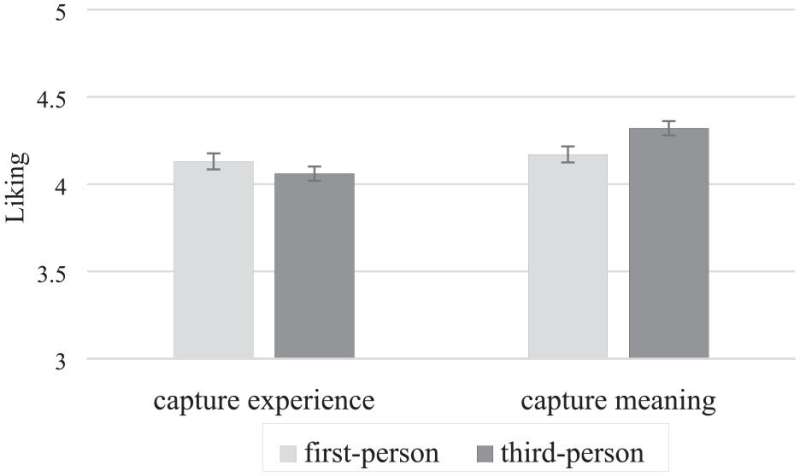This article has been reviewed according to Science X's editorial process and policies. Editors have highlighted the following attributes while ensuring the content's credibility:
fact-checked
peer-reviewed publication
trusted source
proofread
Selfies and other third-person photos help us capture the meaning of moments

Imagine you are eating your dream meal and want to commemorate the moment: Should you snap a picture of the food by itself or take a selfie with your partner while you eat? New research suggests that people use first-person photography, taking a photo of the scene from one's own perspective, when they want to document a physical experience, but opt for third-person photos, depicting themselves in the scene (like selfies), to capture the deeper meaning of events.
Previous research has focused how the photo-taker wants to present themselves to others. The current research, published today in Social Psychological and Personality Science, also considers people who are taking photos for themselves to look back on.
"Not only do we find that most people take both types of photos in different situations, but that people also differ across situations in whether their goal for taking photo is to capture the physical experience of the moment or the bigger meaning of the moment in their life," says lead author Zachary Niese, of the University of Tübingen.
Across six studies involving over 2,100 participants, researchers found that people are more likely to take third-person photos when their goal is to capture meaning, and that people are reminded more of the meaning when looking at their own third-person photos, compared to first-person. Researchers also found that people tend to like their photos more when the perspective matches their goal for taking the photo.
"Taking and posting pictures is a part of everyday life for many people. While there is sometimes derision about photo-taking practices in popular culture, personal photos have the potential to help people reconnect to their past experiences and build their self-narratives," says Dr. Niese.
Dr. Niese warns against inferring that photos taken from one perspective are "better" than another. The research demonstrates that the most effective perspective depends on the person's goal in the moment—whether that be to capture a physical experience or the deeper meaning of an event.
As people become more mindful of their goals when taking pictures and the role of perspective, they can become more skilled at preserving memories that they can reflect on later.
"People's photo-taking practices have the potential to serve a more fundamental human motive to develop and understand our sense of self, both in terms of the experiences in our life as well as their bigger meaning," says Dr. Niese.
More information: Zachary Adolph Niese et al, Picturing Your Life: The Role of Imagery Perspective in Personal Photos, Social Psychological and Personality Science (2023). DOI: 10.1177/19485506231163012



















